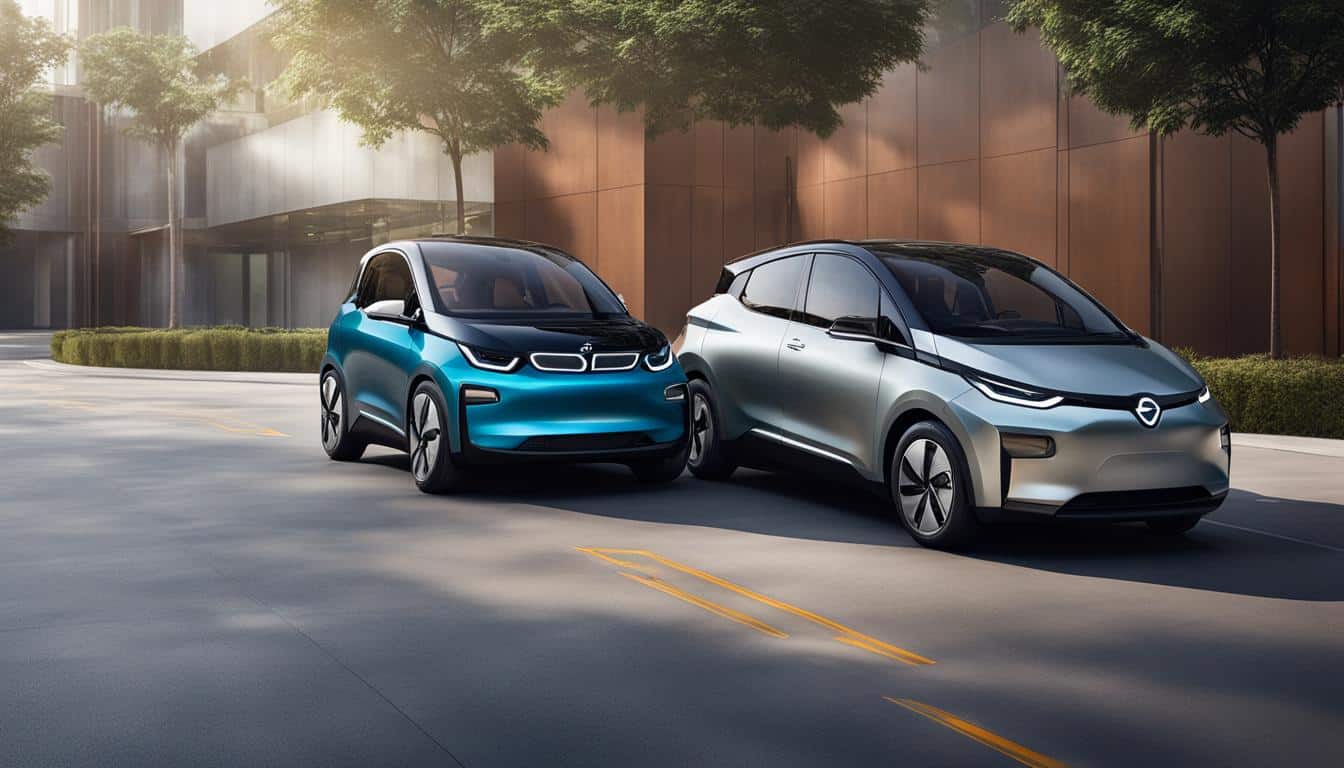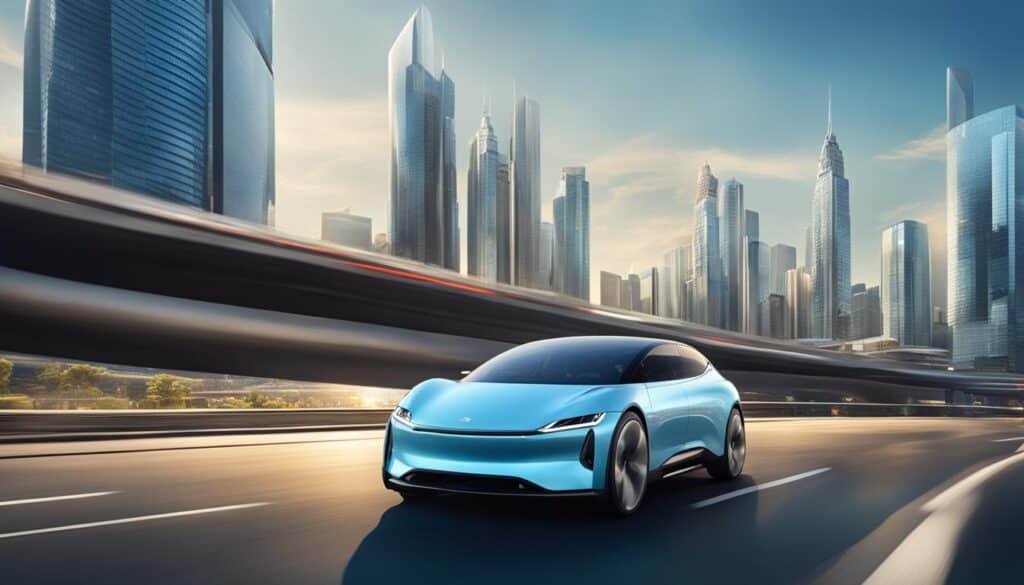
The Evolution of Safety Features in EVs Compared to Gasoline Cars
When it comes to choosing between electric vehicles (EVs) and traditional gasoline cars, safety is a top consideration for drivers. With advancements in automotive technology, both types of cars have implemented various safety features to protect passengers and reduce the risk of accidents. In this section, I will compare the safety features of EVs and gas cars to determine which type of vehicle offers better safety.
Gasoline cars have a robust safety record and have been on the road for decades. They have undergone continuous improvements in safety, resulting in features such as airbags, anti-lock braking systems (ABS), and stability control. These features, along with their higher ground clearance, provide a level of safety that many drivers are familiar with and trust.
On the other hand, electric cars have their own unique safety advantages. One notable benefit is their low center of gravity, thanks to the placement of heavy battery packs beneath the vehicle’s floor. This design feature enhances stability and reduces the risk of rollovers, making EVs inherently safer in certain situations. Additionally, electric cars often incorporate regenerative braking technology, which allows the vehicle to recover energy while braking. This feature not only extends the vehicle’s range but also improves safety by reducing wear on brake components and increasing braking efficiency.
Ultimately, the choice of which type of car is safer depends on personal preference and driving habits. Some drivers may prioritize the familiar safety features and track record of gas cars, while others may be drawn to the unique safety benefits offered by electric cars. It’s important for consumers to understand and evaluate the safety features of both types of vehicles before making a decision.
Key Takeaways:
- Electric vehicles (EVs) and traditional gasoline cars have implemented various safety features to protect passengers and reduce the risk of accidents.
- Gasoline cars have a robust safety record and features such as airbags, ABS, and stability control.
- Electric cars have a low center of gravity and regenerative braking technology, enhancing stability and reducing the risk of rollovers.
- The choice of which type of car is safer depends on personal preference and driving habits.
- Consumers should understand and evaluate the safety features of both EVs and gas cars before making a decision.
Comparing Fire Hazards in Electric and Gas Cars
When it comes to the safety of electric vehicles (EVs) and gas cars, fire hazards are a crucial aspect to consider. In this section, we will explore the fire risks associated with both types of vehicles and compare their implications on safety. By understanding the factors that contribute to fire hazards in EVs and gas cars, we can make informed decisions when choosing a vehicle.
The Fire Hazards of Gas Cars:
Gasoline-powered cars possess inherent fire risks due to the highly flammable nature of gasoline and the potential for fuel leaks. A simple ignition source, such as a spark or an open flame, can lead to a catastrophic fire. Moreover, gas cars often have complex fuel systems that are vulnerable to leaks, which can increase the chances of a fire. These risks have resulted in various fire-related incidents and recalls in gas cars.
The Lower Fire Risk of Electric Cars:
Electric cars, on the other hand, have a comparatively lower fire risk. The stability of lithium-ion batteries in EVs reduces the likelihood of spontaneous fires. Additionally, electric cars are equipped with built-in safety features that shut down the electrical systems in the event of a collision, limiting the risk of fire. These safety measures, combined with strict regulatory guidelines for battery pack design and manufacturing, contribute to the overall fire safety of electric cars.
Comparing Fire Risks in EVs and Gas Cars:
By analyzing the fire risks in both EVs and gas cars, we can draw significant contrasts. While gas cars face inherent fire hazards due to the flammable nature of gasoline and fuel leaks, electric cars offer a lower fire risk attributed to stable lithium-ion batteries and built-in safety features. This comparison highlights the safety advantages of electric cars in terms of fire hazards.
Overall, understanding the fire risks associated with EVs and gas cars is essential in making an informed decision regarding vehicle safety. Electric cars have distinct advantages when it comes to fire hazards, which contributes to their overall safety profile. However, it is crucial to keep in mind that vehicle safety involves various factors, and individual preferences and requirements should be taken into account when selecting a vehicle.
The Health Effects of Gas Car Emissions
In this section, we will explore the health effects of gas car emissions and their impact on human health. Gas car emissions pose significant risks to our well-being, as they release harmful pollutants into the air we breathe. The emissions from gas cars include carbon monoxide, sulfur dioxide, nitrogen oxides, and particulate matter. These pollutants have been linked to various health problems, ranging from respiratory issues to serious diseases.
The Connection Between Vehicle Emissions and Health
The emissions produced by gas cars can have serious implications for our health. Exposure to high levels of carbon monoxide, a poisonous gas released during the combustion of gasoline, can lead to headaches, dizziness, and even death in extreme cases. Sulfur dioxide and nitrogen oxides contribute to the formation of smog and are associated with respiratory problems, such as asthma attacks and chronic bronchitis. Particulate matter, consisting of tiny airborne particles, can penetrate deep into the lungs and cause or worsen respiratory and cardiovascular diseases.
In contrast, electric cars produce zero tailpipe emissions, meaning they do not release harmful pollutants into the environment. This significantly improves air quality and reduces the health risks associated with vehicle emissions. By choosing electric cars over gas cars, individuals can protect their health and contribute to a cleaner, healthier environment.
The Benefits of Electric Cars for Health
Electric cars offer several advantages that positively impact our health. Firstly, electric cars help reduce air pollution, which can improve respiratory health and decrease the risk of related diseases. By minimizing exposure to harmful pollutants, such as carbon monoxide and particulate matter, electric cars contribute to better lung function and reduce the incidence of respiratory infections.
Furthermore, electric cars are quieter compared to gas cars, resulting in a reduction in noise pollution. Chronic exposure to excessive noise levels can lead to stress, sleep disturbances, and increased risk of cardiovascular diseases. The quieter operation of electric cars creates a more peaceful environment, benefiting both drivers and pedestrians.
Additionally, the lower energy costs of electric cars contribute to overall well-being. Electric cars have higher energy efficiency than gas cars, reducing both fuel expenses and reliance on fossil fuels. By saving on energy costs, individuals can allocate more resources to other aspects of their health and well-being.
| Gas Car Emissions | Health Impact |
|---|---|
| Carbon Monoxide | Headaches, dizziness, and potential death |
| Sulfur Dioxide and Nitrogen Oxides | Asthma attacks, chronic bronchitis, and smog-related respiratory problems |
| Particulate Matter | Respiratory and cardiovascular diseases |
Overall, the health effects of gas car emissions are significant and cannot be ignored. By transitioning to electric cars, we can reduce air pollution, improve air quality, and protect our health and the well-being of future generations. The choice between gas and electric vehicles ultimately affects not only our personal health but also the health of our communities and the planet as a whole.
The Hidden Safety Risks of Gas Cars
In this section, I will uncover the hidden safety risks associated with gas cars. Gasoline-powered vehicles pose significant safety risks that drivers should be aware of to ensure their well-being on the road.
The Dangers of Carbon Monoxide Poisoning
One of the most concerning safety risks of gas cars is the danger of carbon monoxide (CO) poisoning. When gasoline is burned in the engine, it produces carbon monoxide, a colorless and odorless gas that can be deadly when inhaled in high concentrations. CO can accumulate inside the vehicle cabin, especially in enclosed spaces like garages or when idling with closed windows.
It is crucial to be cautious of the risks associated with carbon monoxide in gas cars. The invisible nature of this gas makes it particularly dangerous as it can go unnoticed until symptoms of poisoning appear.
To prevent carbon monoxide accidents, it is essential to have regular maintenance done on the exhaust system of gas cars. Ensuring that the exhaust system is in good condition and free from leaks or blockages can significantly reduce the risk of carbon monoxide entering the vehicle cabin.
Fire Risks in Gas Cars
Gasoline’s highly flammable nature poses another safety risk in gas cars. Unlike electric vehicles (EVs) that rely on lithium-ion batteries, gas cars carry a flammable fuel source that can ignite in the event of a collision or other accidents.
Fire-related recalls and incidents tend to be more common in gas cars compared to electric cars, further emphasizing the fire risks associated with traditional gasoline vehicles.
The Rare Danger of Car Explosions
While rare, car explosions are a potential danger in gas-powered vehicles. Gasoline vapor can accumulate in certain conditions, leading to a higher risk of explosions. Factors such as fuel leaks, electrical malfunctions, or even external sources of ignition can contribute to the likelihood of a car explosion.
It is important to note that car explosions are relatively infrequent, but the potential risks emphasize the need for precautionary measures and regular maintenance.
By highlighting these safety risks, I aim to promote awareness and encourage gas car owners to take proactive steps to mitigate these dangers. Understanding the risks associated with gas cars can help drivers make informed decisions to enhance their safety while on the road.
Now that we have explored the hidden safety risks of gas cars, let’s move on to the next section, where we will discuss why all-electric cars are considered the future of safe and reliable transportation.

Why All-Electric Cars are the Future of Safe and Reliable Transportation
When it comes to the future of transportation, all-electric cars are leading the way in terms of safety and reliability. With advancements in technology and a greater focus on sustainability, electric cars offer numerous advantages over traditional gas-powered vehicles.
Advantages of Electric Cars
Let’s explore the key advantages of electric cars that make them the top choice for safe and reliable transportation:
- Cost-effectiveness: Electric cars are more cost-effective in the long run compared to gas cars. With lower fuel costs and fewer maintenance requirements, electric cars help drivers save money over time.
- Positive impact on the environment: Electric cars produce zero direct emissions, contributing to cleaner air and a healthier environment. By reducing our reliance on fossil fuels, electric cars play a crucial role in combating climate change.
- Improved safety features: Electric cars are equipped with advanced safety systems that prioritize driver and passenger protection. Features such as collision avoidance technology, blind-spot monitoring, and lane-keeping assist help reduce the risk of accidents on the road.
- Lower risk of accidents: Electric cars have a lower risk of accidents due to their design and engineering. The incorporation of a low center of gravity in electric cars ensures better stability and handling, reducing the chances of rollovers and collisions.
- Reliability: Electric cars require less maintenance compared to gas cars. With fewer moving parts and simpler drivetrains, electric cars have fewer components that can fail, resulting in increased overall reliability.
By capitalizing on these advantages, electric cars are paving the way for a future that is both safe and reliable. The growing popularity and continuous improvements in electric vehicle technology indicate that the transition towards electric transportation is not only necessary but inevitable.
Take a look at the comparison table below to get a better understanding of the benefits of electric cars:
| Advantages | Electric Cars | Gas Cars |
|---|---|---|
| Lower fuel costs | ✔ | ✖ |
| Reduced environmental impact | ✔ | ✖ |
| Advanced safety features | ✔ | ✖ |
| Lower risk of accidents | ✔ | ✖ |
| Lower maintenance needs | ✔ | ✖ |
| Improved reliability | ✔ | ✖ |
As demonstrated by the table, electric cars outperform gas cars in key aspects, making them a clear choice for the future of safe and reliable transportation.

Conclusion
In conclusion, comparing electric vehicles (EVs) to traditional gasoline cars reveals that EVs offer several safety advantages. With their low center of gravity and regenerative braking technology, EVs have lower risks of accidents compared to gas cars. Furthermore, electric cars outweigh gas cars in terms of fire safety, with fewer fire-related recalls and a lower risk of fires.
However, it is important to note that gas cars have their own safety benefits. They typically have higher ground clearance, which can be advantageous in certain driving conditions. Gas cars also have less susceptibility to power outages, providing a level of reliability in areas with limited charging infrastructure.
When considering reliability, electric cars are rapidly improving. With advancements in technology and lower maintenance requirements, EVs are becoming increasingly dependable. Their durability, coupled with lower operating costs and positive environmental impact, make electric cars a compelling choice for the future of safe and reliable transportation.
Overall, the choice between electric and gas cars ultimately depends on individual preferences and needs. While gas cars still have their merits, the future of transportation is undeniably shifting towards electric vehicles. With their enhanced safety features, reduced environmental impact, and evolving reliability, electric cars are poised to play a significant role in creating a safer and more sustainable transportation ecosystem.
FAQ
What are the safety features in electric vehicles (EVs) compared to traditional gasoline cars?
Electric vehicles have several safety features, including a low center of gravity and regenerative braking technology, which reduce the risk of accidents. Additionally, EVs often come equipped with advanced safety systems such as lane departure warning, automatic emergency braking, and blind-spot monitoring.
What are the fire hazards associated with electric and gas cars?
Gas cars have a higher risk of fires due to the highly flammable nature of gasoline and the potential for fuel leaks. In contrast, electric cars have a lower fire risk attributed to the stability of lithium-ion batteries and built-in safety features that shut down electrical systems in the event of a crash.
How do gas car emissions impact human health?
Gas car emissions, such as carbon monoxide, sulfur dioxide, nitrogen oxides, and particulate matter, are associated with health problems like asthma, lung cancer, cardiovascular disease, and respiratory infections. Breathing in these pollutants can have a negative impact on overall well-being.
What are the hidden safety risks of gas cars?
Gas cars pose several hidden safety risks, including the danger of carbon monoxide poisoning when gasoline is burned. There is also a higher risk of fires in gas cars compared to electric cars, due to factors such as gasoline’s flammable nature. Additionally, although rare, there is a potential danger of car explosions in gas-powered vehicles.
Why are all-electric cars considered the future of safe and reliable transportation?
All-electric cars are considered the future of transportation because they offer several benefits. They are cost-effective, with lower fuel and maintenance costs. Electric cars also have improved safety features, such as advanced safety systems. Furthermore, they have a lower risk of accidents due to their design. Electric cars are also more reliable, with lower maintenance needs and increased durability compared to gas cars.
